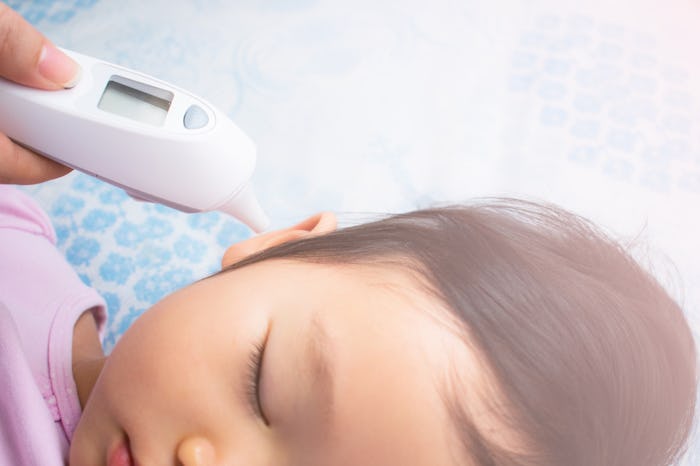Life

Toddler Fevers Are Scary, But Here's When You Really Need To Be Concerned
Having a kid who is under the weather is pretty sad, but it can be a little overwhelming, too. Kids, especially when they are not yet verbal, have a really hard time telling you exactly what's wrong or how they are feeling. Often, you just take your best guess based on their symptoms, behavior, and whether or not they have a fever. But, are fevers always something of concern? And, what's considered a high fever for toddlers? When it comes to children, especially babies, it's often good to err on the side of caution, but how do you know where that line is?
According to Kids Health, children who have a fever under 102 degrees Fahrenheit don't often need medicine unless they are uncomfortable. The exception to this rule is in the case of infants who are under the age of 3 months — if a baby this young shows a rectal temperature over 100.4 degrees, you should always call your pediatrician. If children ages 3 months to 3 years old have a fever of over 102.2 degrees, it should also be brought to your doctor's attention. For older children, anything over 103 degrees would warrant a phone call to your healthcare provider.
Fevers are inevitable when raising kids, but it can be scary at times, particularly for first-time parents. As the Cleaveland Clinic noted, a fever is considered any temperature above 100.4 degrees. Though normal body temperature is 98.6 degrees, body temperature varies throughout the day and throughout people, and anything from 98.6 degrees to 100.4 degrees is said to be within normal range.
Fevers are your body's natural response to infection, and they don't always mean something serious is happening, according to the website for Dr. Sears. If your child is eating, playing, and drinking as normal, a fever may still be nothing to worry about. A child's behavior should always be taken into account, especially for older toddlers — their appetite, energy level, and mood will often signify to you whether or not the illness is on the serious side or not.
Pediatrician Dr. Sarah Kohl tells Romper, "The height of the fever is often due to response of the person who is sick, not the type of infection. That is, some people create higher fevers than others in response to the exact same infection." If a higher fever is combined with true lethargy or irritability (more than just laying quietly or being fussy — this usually means that your child is limp or lifeless, or crying to the point of being inconsolable), be sure to call your doctor right away.
As Dr. Sears' website noted, fevers are often seen as a bad thing or something that could be dangerous, and that's not the case. Fevers are a normal and healthy response of the body's immune system to an illness, often a common bacterial or viral infection (like a cold or stomach virus). Raising your body's internal temperature is how your immune system fights off the infection.
Because fevers are how your body fights off infection, giving your child a fever-reducer (like, acetaminophen or ibuprofen) can actually prolong their illness, mentioned Parents. If you're having to chase around your little one in order to give her a dose, she likely doesn't need it. Sometimes, it's best to let nature take its course, especially if your child's behavior doesn't indicate anything otherwise. Of course, if your little one is achy or uncomfortable, a little fever-reducer or pain-reliever could help ease them, especially before bed. Always check with your doctor regarding the best medication and appropriate dosage for them.
Fevers are, unfortunately, something we have to deal with throughout the course of our babies' lives. Though your comfort in how to deal with them may increase as your child gets older, I'm not sure that the feeling of helplessness that accompanies having to take care of your sick child ever eases.
Check out Romper's new video series, Romper's Doula Diaries:
Check out the entire Romper's Doula Diaries series and other videos on Facebook and the Bustle app across Apple TV, Roku, and Amazon Fire TV.
This article was originally published on